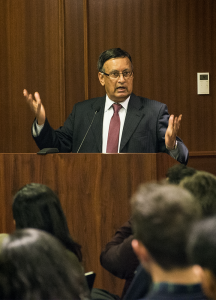
Former Pakistani Ambassador to the United States Husain Haqqani outlined suggestions for ideological and political reforms in Pakistan on Wednesday.
Former Pakistani Ambassador to the United States Husain Haqqani advocated for an overhaul of ideologies and paradigms within Pakistan, including the ways Pakistanis study and learn their history as well as their relationship with Islam, in a panel discussion titled “Reimagining Pakistan” held in the Mortara Center for International Studies on Wednesday.
Along with Hamad bin Khalifa Al-Thani, a member of the ruling Qatari royal family, Professor in the History of Islam Tamara Sonn and Professor Christine Fair, the ambassador highlighted ways to confront the ideologies fueling instability within Pakistan and the surrounding region.
Haqqani was exiled from Pakistan in 1999 following his criticisms against the government. He then taught as a professor at Boston University from 2004 to 2008 before serving as Pakistan’s Ambassador to the U.S. in 2008. He resigned after pressure from officials in Pakistan, who alleged the ambassador attempted to solicit support from the U.S. military if a military coup took place in Pakistan. He left Pakistan in 2012 and has not returned since.
Haqqani’s remarks first focused on the ways extreme Islamic ideology continues to plague Pakistan’s own population as well as the country’s stability.
Haqqani said Islam — once a uniting force following Pakistan’s independence in 1947 — has been utilized by leaders in Pakistan to exert control over regions and ethnic groups within the nation.
“Islamic ideology has been used essentially to be able to perpetuate the ethnic domination of groups instead of uniting a federation of partners,” Haqqani said. “Pakistan needs to morph into a more fair federation that accepts its diversity instead of insisting that we will try to create one nation by enforcing everything from the top.”
Many minority groups within the country have suffered from such domination, particularly Ahmadi Muslims. Ahmadis belong to a specific sect of Islam, but officials within Pakistan consistently oppress the group. When filing official documentation, other Pakistanis are required to denounce Ahmadis as well.
“Every Pakistani who applies for a passport as a Muslim, in order to perform a pilgrimage to Mecca, is required to sign a declaration that disavows Ahmadi beliefs and disavows them as Muslims,” Haqqani said. “Instead of uniting, [religion] has become a divisive factor.”
Later in the discussion, Sonn noted Haqqani’s desire to see religious ideology move out of the Pakistani legislature. She raised questions as to whether it was Islam itself that contributed to the suffering of minorities or if it was the way religion played out in public discussion.
“In particular, your proposition is that it is very important for Pakistan to give up its ideological paradigm when it comes to [Islam],” Sonn said. “Could it not be said that there would be a reimagining of public discourse about Islam [instead]?
Haqqani said the Pakistani state continues to see competition with India as one of the primary purposes of its existence. He argued that the government and leaders are obsessed with establishing dominance over India, though such thinking is unsustainable.
“Does [Pakistan] want to be a country that derives its pride from the size of its nuclear arsenal, or are we going to derive pride from having a nation that actually looks after its people?” Haqqani asked. “Pakistan cannot achieve any of that until it ends this perennial competition it has with our much larger neighbor [India].”
Fair reiterated this point during her own remarks. She said it is important to explore how to deal with such misbeliefs and fallacies in light of the Internet, journalism and public discourse.
“Pakistani textbooks and media keep claiming that India has started every war and Pakistan has won every war,” Fair said. “So what accounts for this enduring accumulation of fiction that so many Pakistanis rehearse in their curriculum and elsewhere as fact, despite empiricism? How do you puncture the bubble of nonsense?”
One method for changing such views and ideology lies in revisiting the ways Pakistanis are taught about their history and their national identity. Haqanni advocated for changing the ways Pakistani citizens view themselves in relation to the world.
“The reimagined Pakistan would tell our young people that you are Pakistanis because you were born in a country called Pakistan … Surely Pakistan can revisit its own history and say ‘We did something wrong somewhere and this is how we can change it’ and that is what I think is needed,” Haqqani said.
Moez Hayat (SFS ’19), who is ethnically Pakistani and attended the event, said the ambassador’s comments reflected ideas that were too dismissive of the idea of Islam as a uniting force.
“As a Pakistani and as a Muslim, I found this conversation interesting, but unhelpful at its best and insulting at its worst,” Hayat said. “While everyone agrees many of Pakistan’s problems lie with its military and security institutions, the idea that Pakistan as an idea should be changed is laughable.”
Hayat said instead that Islam should be a unifying factor in Pakistan.
“No matter how many times it fails, the actual idea of Pakistan will always be just,” Hayat said. “The idea of Pakistan as a state based in Islam is part of the solution, not part of the problem. The idea of Pakistan may need repair, but it does not need to be reimagined.”
Ali Rehman (COL ’17) also disagreed with some of Haqqani’s specific ideas, though she said she appreciated his efforts to spur progressive thinking among Pakistani communities both in America and in Pakistan.
“He presented a more progressive view, something a lot of my friends [from Pakistan] discuss here in the U.S.,” Rehman said. “While some of his viewpoints may not be agreeable, they are still good starting ground for the future of Pakistan and the improvement of the [Pakistani] people.”




















